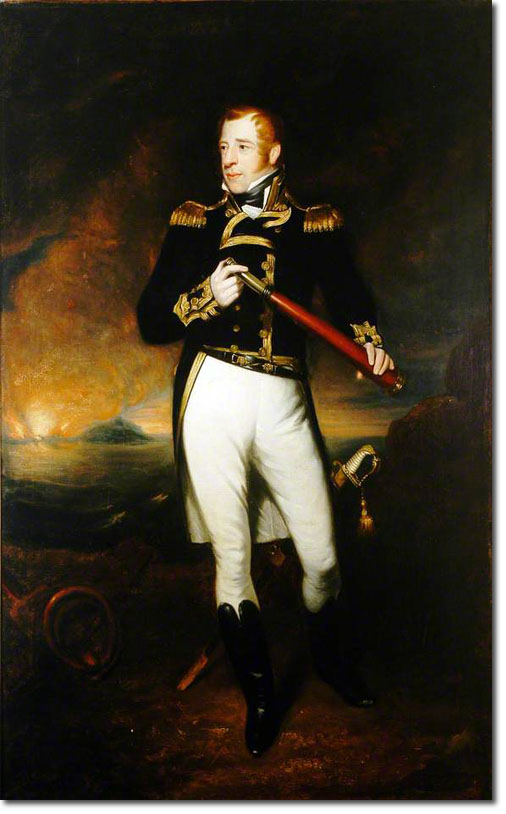|
|


|
|
At the same time as much of the British Army was being
disbanded after Napoleon's defeat at Waterloo in 1815, the
colonial peoples of the ancient Spanish and Portuguese
empires in Latin America were fighting for independence.
It was a golden opportunity for the thousands of unemployed
British troops, who enrolled as mercenaries in Brazil, Chile
and Venezuela. The most celebrated of them was Lord Thomas
Cochrane, 10th Earl of Dundonald, who became
Admiral of the Chilean Navy. A turbulent career in the Royal
Navy during the Napoleonic Wars had won Cochrane a place
in Naval history, a fortune
in prize money - and the
Admiralty's undying hatred.
Brilliant seamanship, courage,
audacity and tremendous
aggressiveness were the
secret of his victories, but
the Admiralty thought him
"unruly," while Earl St. Vincent,
the First Lord, called
him "proud, wrong-headed
and violent."
The crisis came for Cochrane when, still a captain, he knocked out five French warships in 1809 in the battle of Aix Roads. Admiral Gambier, the British Commander-in-Chief of the Channel fleet, refused to give Cochrane the support that would have enabled him to destroy the whole French fleet, and ordered him to withdraw. It was an extraordinary command, and afterwards Cochrane instigated the Admiral's court martial. However, furious at such action from a junior officer for whom they had no liking, the Lords of the Admiralty rigged the trial, cleared Gambier and disgraced Cochrane, who lost his ship. Worse followed. Becoming the dupe of crooks in a Stock Exchange swindle, he was tried, found guilty and sentenced to a 1,000 Pounds fine and twelve months imprisonment. Incensed by such treatment, Cochrane launched a campaign in Parliament against government corruption, but this brought him little personal satisfaction. When Chile offered him command of its navy, with vice-admiral's rank, he accepted without hesitation, and sailed for Valparaiso with his wife and five-year-old son. By now, Chile had proclaimed independence. But the Patriots, led by General San Martin and Bernardo O'Higgins, were at the mercy of the Spanish fleet. While it ruled the sea Chile's fledgling independence could be easily destroyed. Cochrane, with a navy consisting of only one 48-gun frigate, two East Indiamen with 44 and 64 guns respectively, and four sloops each with four guns, was now expected to overcome the entire Spanish Pacific fleet. He decided to attack the strongly defended Spanish naval base of Callao first, but on the way there the crews of his two largest ships mutinied because they had not been paid and refused to fight . Even so, Cochrane engaged some of the enemy ships in the outer harbour, sunk one of them and then withdrew a short distance to mount an effective blockade of the harbour. During this short engagement Cochrane's attention was distracted briefly by a touching incident. His son, Tommy, had hidden on board to see the fighting. The boy suddenly came on deck and was standing beside a marine, where his father could not see him, when a shot tore off the marine's head. Splashed with blood, the boy ran up to his horrified father, sobbing: "They have killed poor Jack, Papa, but I am not hurt." Pointing to the hole the expended shot had made in the ship's hull, Cochrane said coolly: "Put your head in there Torn, and stay there. No shot comes through the same hole twice." Fortunately, he was right. Cochrane afterwards seized the strategic island of San Lorenzo, which dominated Callao's approaches. Using it as a base, he sank the Spanish warships whenever they ventured out. Valdivia, in the south, then fell to him in a combined operation by sea and land. Spanish power in the area was all but broken. General O'Higgins, in a tribute to Cochrane, said that "the Spanish viceroy had been shut up in his capital and his convoys both by sea and land intercepted, while his ships of war did not venture to emerge from their shelter." Cochrane refused a handsome reward because his sailors were still owed months of pay - a problem he then solved himself, in typically unconventional fashion: he seized $285,000-worth of bullion that General San Martin was transporting from Lima, and paid his sailors with the booty taken from his own employer. When Cochrane left Chile for Brazil in January 1823, he had sunk or captured every enemy vessel in the Pacific. He then transferred his remarkable energies to Brazil for a short time, helping the Brazilian revolutionaries to destroy the Portuguese fleet. He later secured reinstatement in the British Navy and died in London in 1860, at the grand age of 85. Image courtesy of Government Art Collection |
Armed Forces | Art and Culture | Articles | Biographies | Colonies | Discussion | Glossary | Home | Library | Links | Map Room | Sources and Media | Science and Technology | Search | Student Zone | Timelines | TV & Film | Wargames